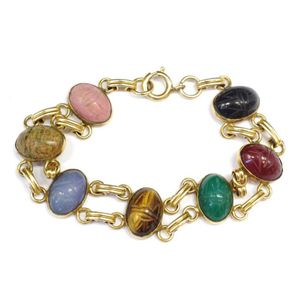Scarab Gemstone Bracelet with Multi-Stone Cabochons
Vintage carved gemstone scarab beetle bracelet set in a gold filled setting. Approx length 18 cm, cabochon size 13 x 10 mm. Includes; Unakite, chalcedony, tigers eye, carnelian, onyx, Rhodonite
You must be a subscriber, and be logged in to view price and dealer details.
Subscribe Now to view actual auction price for this item
When you subscribe, you have the option of setting the currency in which to display prices to $Au, $US, $NZ or Stg.
This item has been sold, and the description, image and price are for reference purposes only.
- Carnelian Glass - Carnelian glass is a type of glass that is colored red, orange, or brownish-red. It is made by adding iron oxide to the glass mixture. The color of carnelian glass can vary depending on the amount of iron oxide that is added, as well as the firing temperature. Carnelian glass is often used to make beads, jewellery, and other decorative items. It can also be used to make stained glass windows and other art objects. Carnelian glass is sometimes called "carnelian chalcedony" or "carnelian quartz."
Carnelian glass was first made in the Roman Empire. It was also made in ancient Egypt, Greece, and Mesopotamia. Carnelian glass was not made again until the Renaissance, when it became popular again. Today, carnelian glass is made in many countries around the world. - Scarab Beetle - xx
- Cabochon Cut in Jewellery - A cabochon cut is a type of gemstone cutting where the stone is cut and polished in a convex shape with a flat bottom and a domed top, with no facets. This type of cut is typically used for opaque or translucent stones that have natural patterns or inclusions that are best displayed in this type of cut. Examples of stones that are often cut as cabochons include turquoise, opal, and moonstone.
- Onyx - Onyx is a form of agate, used from antiquity and popular again in the 1920s and 30s. European onyx is generally green, but can be many other colours, and can contain bands of black and/or white.
This multicoloured stone is widely used for table tops, lamp bases and in jewellery. Some types of onyx are also used for cameos of which the upper white layer is cut away to reveal the colour beneath.
This item has been included into following indexes:
